Are you taking a workshop anytime soon? I recently taught my workshop, Ramp Up Your Colour, to a small group of students on Salt Spring Island. Their focus and willingness to follow where I led was so rewarding. They really were the ideal students! Seeing their dedication to learning inspired me to write this post about ways to get the most out of a workshop.
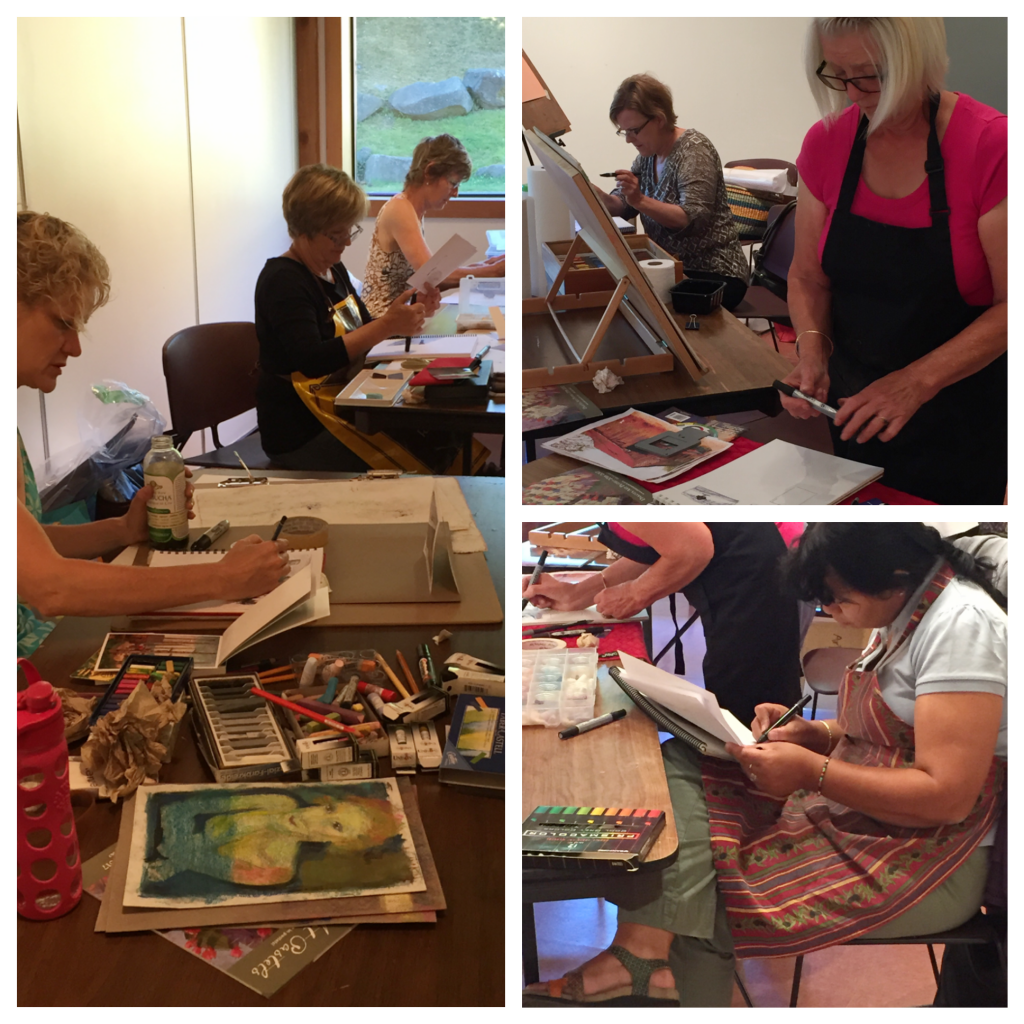
1. Know why you are there
At the beginning of a class, I always ask students a) why they are at the workshop and b) what they hope to come away with. Knowing the answer to these questions will help you get the most out of a workshop. Your answers could be as simple as, “I haven’t been painting as much as I’d like and so I want this workshop to get me going again,” or as specific as, “I like the way you work and I want to learn your layering technique,” or “I want to be more free with colour but I can’t seem to get away from ‘realistic colours’ so I want to go home with a way to use colour more spontaneously.’
2. Be brave
Follow instructions even though you’ve never done things that way before or you’ve never used those colours before, and you’re certainly unsure of how things will turn out, . For example, you may love using your fingers to blend pastels but the instructor may not use that technique so for the sake of the workshop, don’t use your fingers. You can always revert to the way you did things once you’re back home. Go to the workshop with a mindset of, “What if I ….” and see what happens. Workshops are the place to make mistakes. When you try new techniques, new ways of doing things, you are bound to mess up. Which brings me to the next point.

3) Leave that inner critic at home
When we make mistakes, it’s so easy to beat ourselves up. Our ego viciously says, ‘What rubbish!’ And then we’re tempted to go back to doing what we know and what works for us rather than stretching ourselves into new territory. But pushing your boundaries is the purpose of being at a workshop. So instead, go to the workshop with the intention of messing up royally. Be disappointed if that’s not what’s happening. Let your inner judge tell you off for not accomplishing that goal!
4) Get comfortable with being uncomfortable
Really! It’s when you’re uncomfortable that you’re in the process of growing. This is the point at which your art-making evolves. Comfort means doing something we’re familiar with doing. To get the most out of a workshop, it’s preferable to shake hands with the unknown. Get to know it by prodding and poking and trying out what might not feel easy or pleasant but which will, in the end, bring progress and benefit. Whenever we try something new, no matter what it is, there’s a feeling of anxiety. Embrace the struggle, the frustration, as part of the evolutionary process of becoming more who you are as an artist.

5) Focus on process rather than outcome
Workshops are places to mess up, to explore, to fearlessly try out new things. Focus on the learning and know you will come away with experimental pieces of trial and error. It’s in the doing that new possibilities emerge. If you focus on outcome, you may create something that disappoints you and naturally your ego will jump in and give you a telling off. A beautiful piece may emerge and that’s wonderful but better not to go in expecting success because you’re most likely to be disheartened when it doesn’t happen. Learning takes time. It’s not a magical pill that will have you creating masterpieces on the spot!
6) Don’t be afraid to ask questions
The instructor is there for you so be sure to make the most of his time! You know your goal for the workshop (see point 1) so ask questions that will get you there. Don’t ever think a question is silly or unimportant. If you are thinking it, no doubt someone else has a similar question. Questions help everyone (including the instructor!). At the same time, don’t be a time hog. The instructor wants to give time to each student. Don’t make it difficult for her to distribute her time fairly. Be self-aware of how much you speak/ask questions. If you are more of an extrovert and talkative, intentionally hold back. If you’re an introvert who tends not to say much, be intentional about asking questions. Know thyself and do what doesn’t come naturally. (This will help with doing the same in your work!)
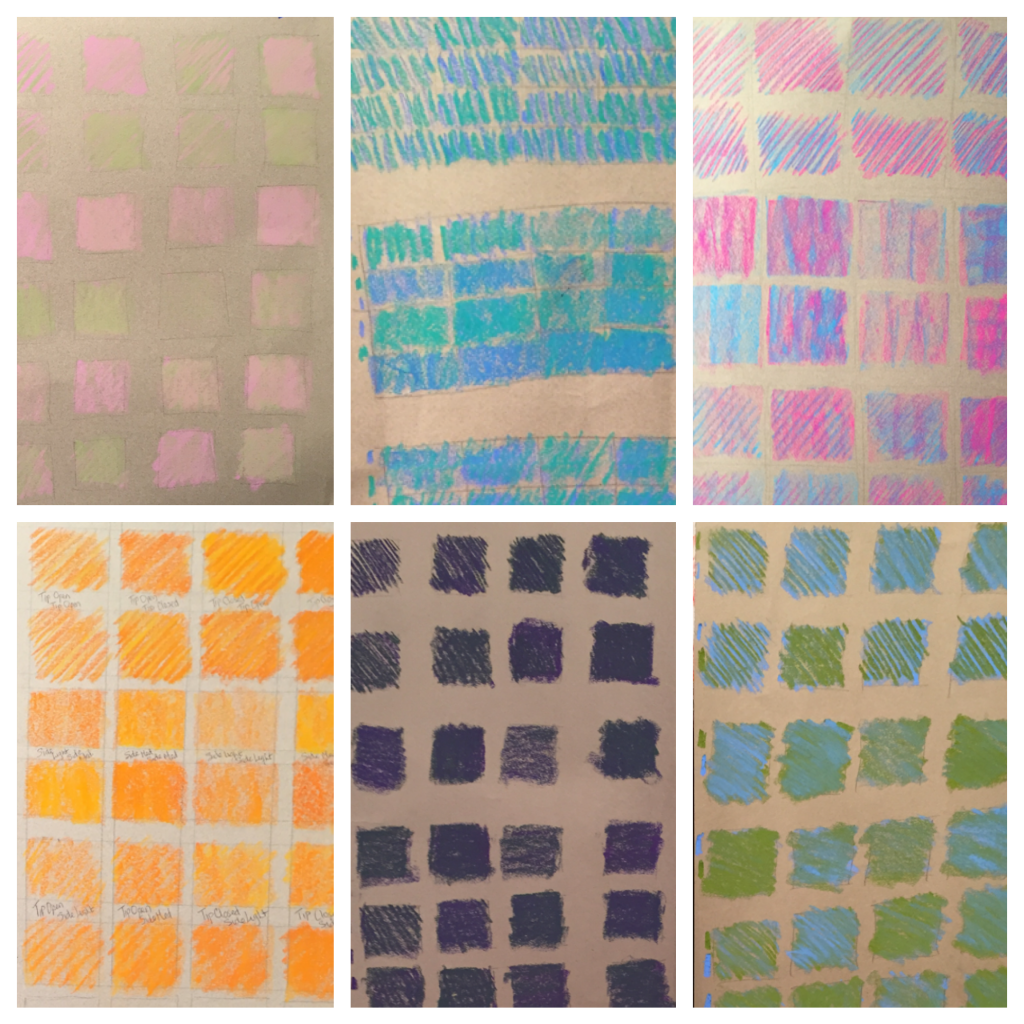
7) Be open to critiques
Don’t take anything personally. Hearing an instructor’s and other students’ views of your work will all be helpful. You may not agree with some of it but keeping an open mind will allow you to absorb all that’s being said. And you never know where the gems of significant feedback will come from that will take your work in a new direction. The ability to give feedback to others is important too as it will sharpen your own looking skills. Be thoughtful about what you say to others about their work – think strengths as well as areas that you feel could be enhanced.
8) Come to the workshop with the required supplies
Generally, an instructor tailors the supply list to the workshop. If you have problems obtaining anything, be sure to contact the instructor prior to the workshop rather than second guess an alternative which may not be suitable. The supply list is there for a reason. Having the necessary supplies will help you get the most out of a workshop.

9) Put blinders on
Try not to compare yourself to others. Everyone comes to the workshop at different stages in their artistic development. It’s easy to get upset by your own work compared to the success someone else may be having. The only person you should be comparing yourself to (and I don’t even like to use the word ‘compare’) is yourself. Focus on what you are at the workshop to learn. That’s your goal. Not to be better than someone else.
10) Take notes
You may think you’ll remember everything but believe me, you won’t. Record your learnings in a way that works for you. That could be writing notes, making sketches, drawing mind maps, or taking photos. Although most instructors won’t mind, if you do want to take photos, remember to ask the instructor’s permission first. Reread your notes after the class and/or in the morning. Getting the most out of a workshop also means, once home, continue to refer to your notes so you can recall and apply what you learnt.

11) At the end of the workshop day, relax!
If you’re attending a workshop that’s more than a day long, take time to unwind at night – socialize, read, eat, dream – rather than continuing to work. A whole day of learning and creating is exhausting! The best thing to do is to take yourself away from the day. Perhaps take some time to review your notes (you can also do this before class begins the next day) but otherwise, take the evening off from art. That way, you come to a new day at the workshop refreshed and eager to go again AND prepared to get the most out of taking the workshop!
12) Meet new people and make new friends
Workshops can be full of like-minded people from all over. Deep friendships can happen. Lunchtime is a great opportunity to introduce yourself and share your ideas. Initiate a conversation and see what happens.

13) Have fun!
A workshop is a way to remove yourself from your daily life (especially if you need to travel away from home to take it). It’s a serious learning environment but that doesn’t mean you can’t have fun! Allow yourself to play. To laugh at mistakes. To delight in new discoveries. To be in the moment and enjoy it! Truly, this will help you get the most out of a workshop!
14) Beware the post-workshop slump
Continue to work at what you’ve learnt in the days and weeks following the workshop. Don’t delay. Put your learning to work right away. Know too that your work may take a bit of a backward step as you begin to assimilate new techniques, new colours, new materials. Remember too to wait a while before taking another workshop. I’d say to wait at least six months and preferably a year. This will allow you time to incorporate all you learnt at the workshop and to develop your work.

A workshop is a place to take risks. That’s how you grow. And taking risks means being vulnerable and that’s not usually easy especially among strangers. But being vulnerable and open and curious will help you get the most out of a workshop.
Have I missed any points? What are your experiences with workshops? What was the best one you took and how did you yourself make it that way? How do you get the most out of a workshop? I’d love to hear from you!
Until next time,
~ Gail


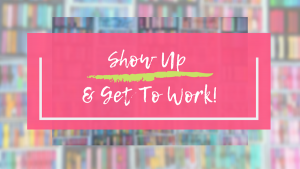










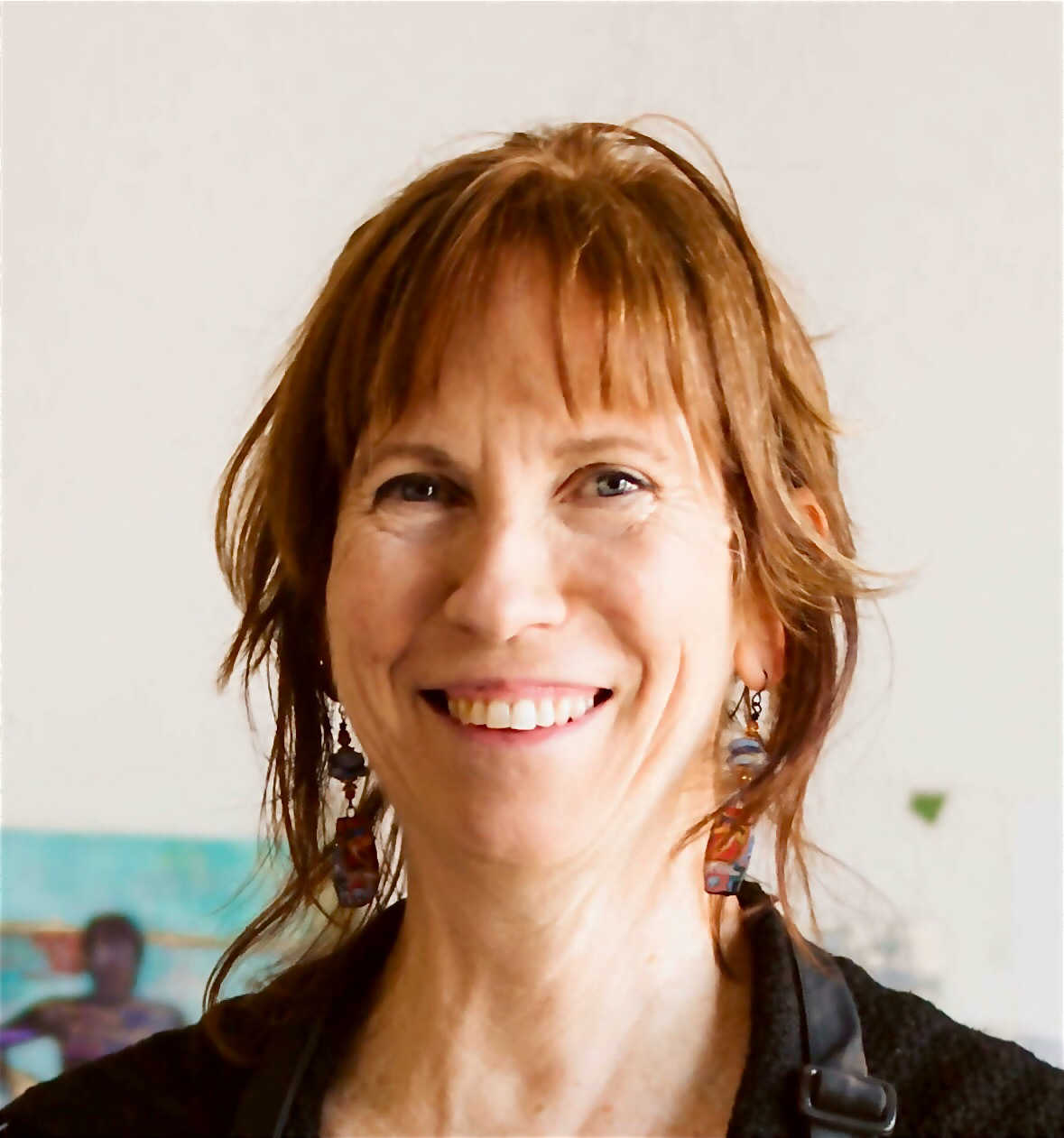
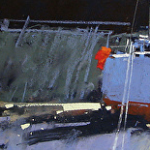


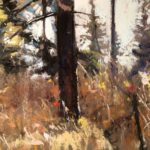


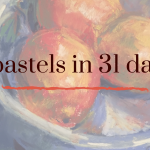
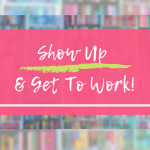

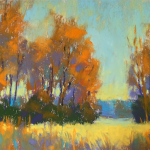
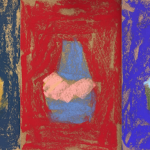




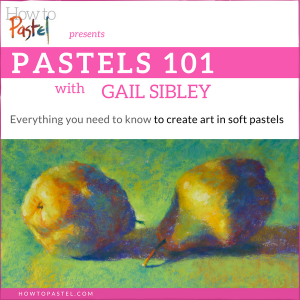

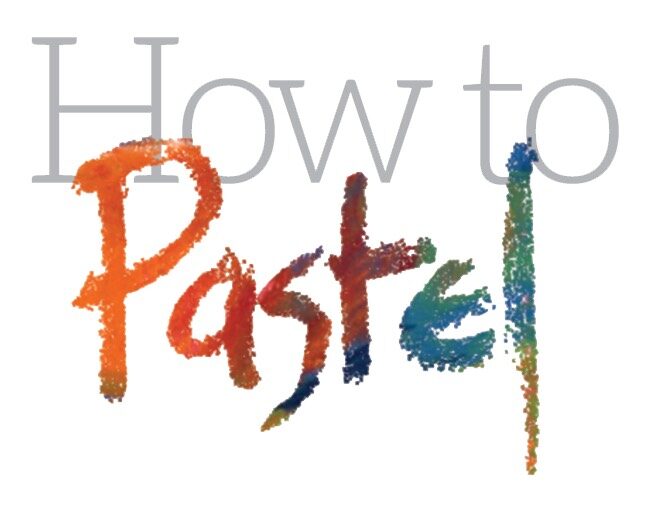

13 thoughts on “14 Ways to Get the Most Out of a Workshop”
Hi Gail,
I am a member of the Pastel Artists of South Australia and we do a monthly members-only newsletter. I am very keen to have your permission for us to use some of your “14 Ways to get the most out of your workshop” article. I am a pastel artists and teacher and I agree most heartily agree with your suggestions for workshop participants.
I look forward to hearing from you,
Glenda
Hi Glenda, I’d be happy for you to use my post. I’m glad it resonates with you!
Great information to use even if the workshop is a live rf video one on the computer.
Glad you find it useful Cheryl and thanks for bringing up that it’s applicable to online workshops too!
Gail, I am going to several workshops next year. I have felt, in the past, that I didn’t benefit as much from workshops as I should have. I read your blog with great interest. I think I am the reason I didn’t learn as much as I should and your insight is right on. I will keep your advise at hand! Thanks! Connie
Connie it’s wonderful to recognize the part you play in your own experience of a workshop (or anything!). I feel so rewarded that you find this info useful 🙂
Gail:
Hi There! This is such good information. I am a member of a small art group in Michigan, and we have a workshop coming up this fall. With your permission, I would like to share your information with the other members. Please and thank you for all of your tips. Kathy
Hi Kathy,
YES, by all means share this post with your members!
Thank you so much!
Happy Painting!
Kathy
I am the newsletter editor of the Central PA Pastel Society and I, too, would like to request permission to use your text from the “14 Ways to Get the Most Out of a Workshop” in our monthly newsletter. Of course, I will attribute it to you and your blog. It’s well-written, right on and contains pertinent information for everyone.
Jill thank you!! And yes, by all means use it. I appreciate you asking and I love knowing it will be helpful!
Hello Gail,
With your permission I would also like to include your article in our newsletter, for the members of the Tasmanian Art Society. I am sure our members would find it helpful.
Cheers, Lorraine
Go for it Lorraine!!! And thanks for asking 😁